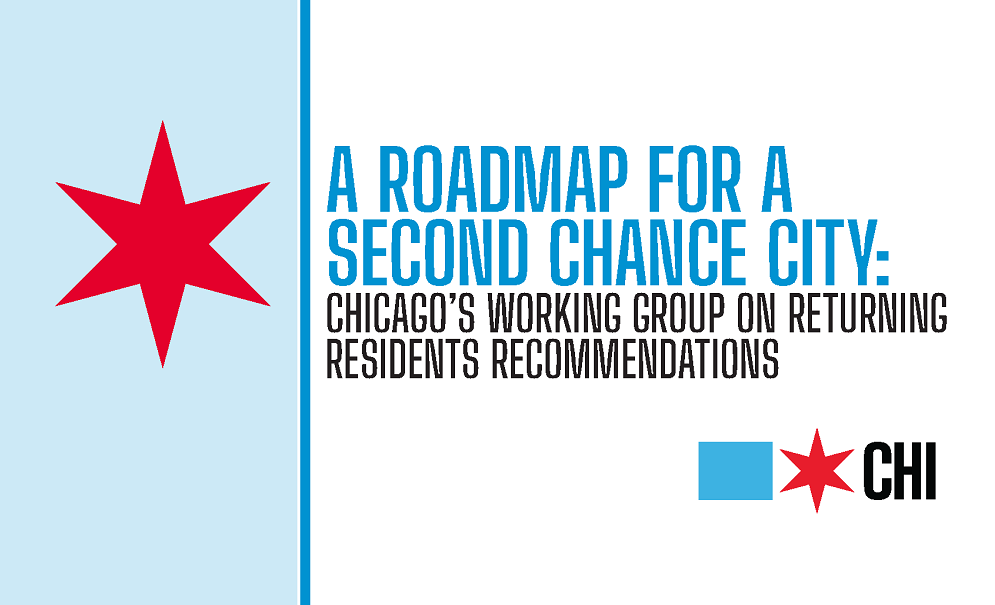The City of Chicago is committed to ensuring that Chicago is a national leader in supporting returning residents during their transition back home to Chicago communities. Through collaborations with the Returning Residents Working Group, the Interagency Re-Entry Council, and other stakeholders, the City aims to address issues that currently impede returning residents’ ability to access the economic opportunity, housing, healthcare, and support services that allow them to reestablish their lives in Chicago.
Beginning in early 2021, the Mayor’s Office and various partner organizations convened a Working Group on Returning Residents (RRWG) to discuss the challenges faced by Chicagoans returning from jail or prison, and to propose recommendations for how the City could address them. This work brought together experts in the re-entry space including direct service providers, government representatives from the City, County, and State, policy advocates and researchers, along with people with a history of legal system involvement to share their lived experience.
The goal of this Working Group was to understand the ways in which the City has tried to support returning residents in the past, recognize where it has been successful, acknowledge where it has fallen short, and look to best practices around the country for a path forward to meaningfully improve the life outcomes of returning residents. Currently, people leaving incarceration face enormous obstacles to successful re-entry and many find themselves homeless, unemployed, and relentlessly driven back to the illegal economy simply to survive. The Working Group focused their recommendations on strategies the City could pursue to achieve positive goals and metrics (I.e., employment, housing stability, access to support services) because they are known to significantly improve life outcomes for returning residents and they have the added benefit of reducing recidivism and improving public safety.
The initial phase of work by the RRWG culminated with the publishing of the Roadmap for a Second Chance City Report. See the tab to the left on this page for more information about the report.
Guiding Principles
Before discussing policy recommendations, the Working Group on Returning Residents grounded itself in a set of guiding principles, which provided a strong foundation to evaluate potential recommendations. The principles established by the group were:
- The City’s returning residents support strategy will have the added benefit of reducing crime but primarily focuses on mitigating the structural impacts of racialized and gender-based poverty.
- People who have been convicted, served time in jail or prison, and/or are currently in community corrections (electronic monitoring/home confinement) must have support to permit them to return successfully to the community.
- Returning residents are part of a community that has been impacted by their incarceration—children, spouses, parents, and other caregivers. Support systems for formerly incarcerated individuals must account for all of these stakeholders.
- Programs and policies should be explicitly designed to address the structural barriers facing returning residents, including racism, gender discrimination, and discrimination based on one’s record. Institutions and organizations must center the voices of those who are formerly incarcerated in program and policy design and delivery.
- City departments and agencies should deliberately focus trauma-informed services and City resources toward people recently released from incarceration and their families.
- Government and community partners should design a system that plans for re-entry when an individual first has contact with the carceral system, and support services to address individual needs must account for a long-time horizon of need, not just the period of re-entry.
Members of the RRWG include representatives from John Howard Association of Illinois, the Illinois Justice Project, BPI Chicago, Cermak Health Services, the Chicago Cook Workforce Partnership, Chicago CRED, Chicago Funders Together to End Homelessness, Giving Others Dreams, Grand Victoria Foundation, Heartland Alliance, Howard Brown Health Center, the Inclusive Economy Lab, Inner-City Muslim Action Network, Institute for Non-Violence Chicago, Joyce Foundation, Pritzker Family Foundation, Legal Aid Chicago, Live Free Chicago, Loyola University Chicago, McCormick Foundation, the Metropolitan Planning Council, People’s Liberty Project, Previous Blood Ministry of Reconciliation, Restore Justice, Safer Foundation, Smart Policy Works, Target Area Development, TASC, Inc., Tillman Training, University of Chicago, West Side Justice Center, the Women’s Justice Institute, World Business Chicago, as well as individuals from the City of Chicago, Cook County, and State of Illinois governments.




In November 2021, the City of Chicago and the Returning Residents Working Group (RRWG) released the Roadmap for a Second Chance City Report, the culmination of months of work by the RRWG. The report represents the Working Group’s blueprint for how the City of Chicago can work across departments and sister agencies—and with other governments and social service providers—to enable better health and economic outcomes for Chicago’s returning residents.
The report provides recommendations for action that correspond to four primary goals:
- Improve economic mobility and opportunity
- Improve access to healthcare
- Improve access to housing
- Improve City coordination and leadership




The Interagency Re-Entry Council, chaired by Mayor’s Office Director of Re-Entry Willette Benford, is made up of Commissioners and City staff from City of Chicago Departments and Sister Agencies. It is the governing body charged with implementing the recommendations in the Roadmap for a Second Chance City Report, and it was formed through an Executive Order in November 2021.
- Purpose: To eliminate the silos that are inadvertently created while working in individual City agencies and create a whole-of-government approach to re-entry, with a coordinated strategy amongst departments to better serve our returning residents and their families.
- Mission: To improve economic and social outcomes for people with records.
During the Interagency Re-Entry Council’s inaugural year, leaders from City Departments and Sister Agencies collaborated to define goals for how each department or agency will take action to better support Chicago’s returning residents in 2023.
Read the 2023 Interagency Re-Entry Council Departmental Goals





